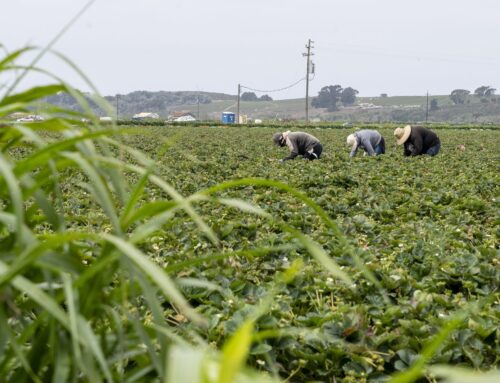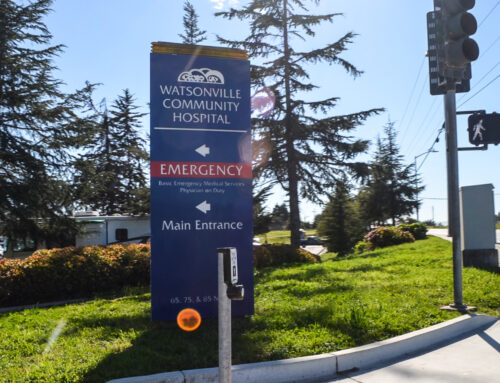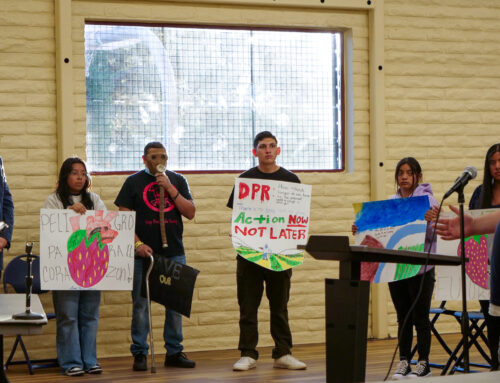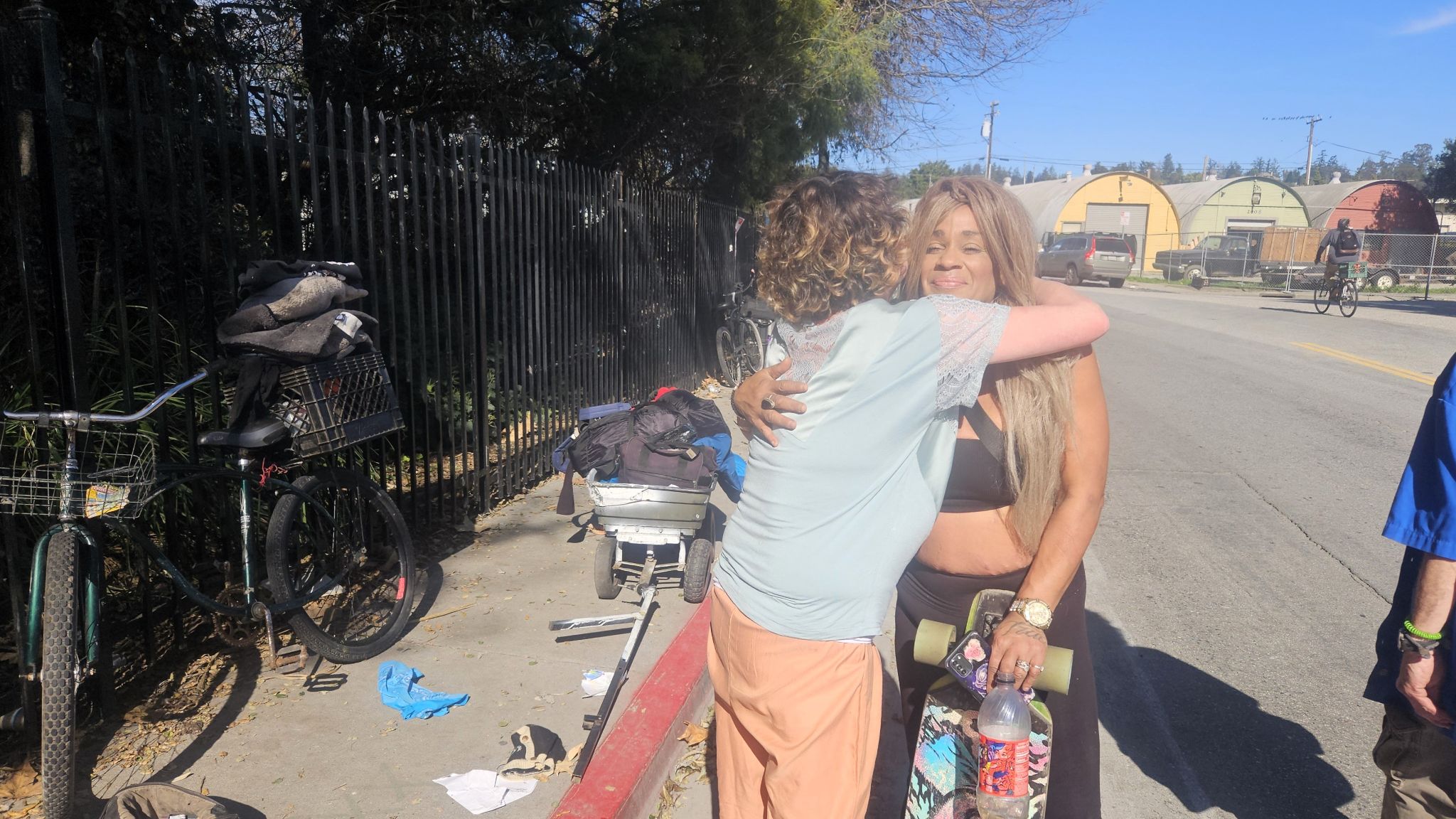
Shannon Vudmaska, left, hugs her neighbor Erica Bertao on Coral Street where many clients of the Harm Reduction Coalition’s needle exchange live. (Tyler Maldonado — Santa Cruz Local)
SANTA CRUZ >> Three months after a court ruling shuttered a needle exchange mainly run by volunteers in Santa Cruz County, the county’s Health Services Agency has more than doubled its clean syringe distribution and run a mobile needle-exchange program in Santa Cruz.
Two needle exchanges operated in Santa Cruz County until November: One service run by the County of Santa Cruz’s Health Services Agency and another run mainly by volunteers of the Harm Reduction Coalition of Santa Cruz County.
Both exchanges provided new syringes and the anti-overdose drug naloxone to try to improve the health of people who use drugs and offer treatment. Some residents have blamed the exchanges and their participants for leaving syringe litter in parks, waterways and other public places.
Read Santa Cruz Local's Election Guide
Santa Cruz city parks staff collected about 3,000 needles in 2023, compared with about 2,300 needles collected by city workers in 2016. The Downtown Streets Team, county parks staff and others also find and dispose of needles not included in that count.
A 2020 lawsuit alleged that the Harm Reduction Coalition’s needle exchange “poses a serious threat to the health and safety of the citizens of Santa Cruz County.” It said the exchange should be shut down in part because “they have failed to perform the required environmental review needed for the distribution, collection and disposal of used needles.” The Grant Street Neighborhood Association Advocates brought the suit along with Santa Cruz City Councilwoman Renee Golder, former Santa Cruz police chief Kevin Vogel and others. Former Santa Cruz Mayor David Terrazas was one of the plaintiffs’ attorneys.
In November, an appellate court ruled that the California Department of Public Health improperly approved the coalition’s application to operate a needle exchange in Santa Cruz County. It ordered the coalition to stop distributing needles.
The coalition had distributed an average of 25,375 syringes monthly until November. The demand for clean needles did not go away.
In December and January, the County of Santa Cruz’s needle exchange distributed more than 12,500 syringes on average each month. That’s more than double the county’s average syringe distribution from the months prior. Syringes are also sold at some pharmacies.
It’s not yet clear whether there have been more overdose deaths or greater disease transmission since November, in part because of a lag time in reporting, said Corinne Hyland, a spokesperson for the county’s Health Services Agency.
“We all care about the safety of our community,” wrote Dr. Lisa Hernandez, the Santa Cruz County health officer, in an email to Santa Cruz Local. Needle exchanges “play a vital role in reducing infections such as HIV and Hepatitis C, connecting individuals to treatment, and ensuring proper needle disposal,” Hernandez wrote.
“Programs that include mobile exchange, such as the Harm Reduction Coalition’s program, provides equity across the county and reaches those most in need, linking them to services,” Hernandez wrote.
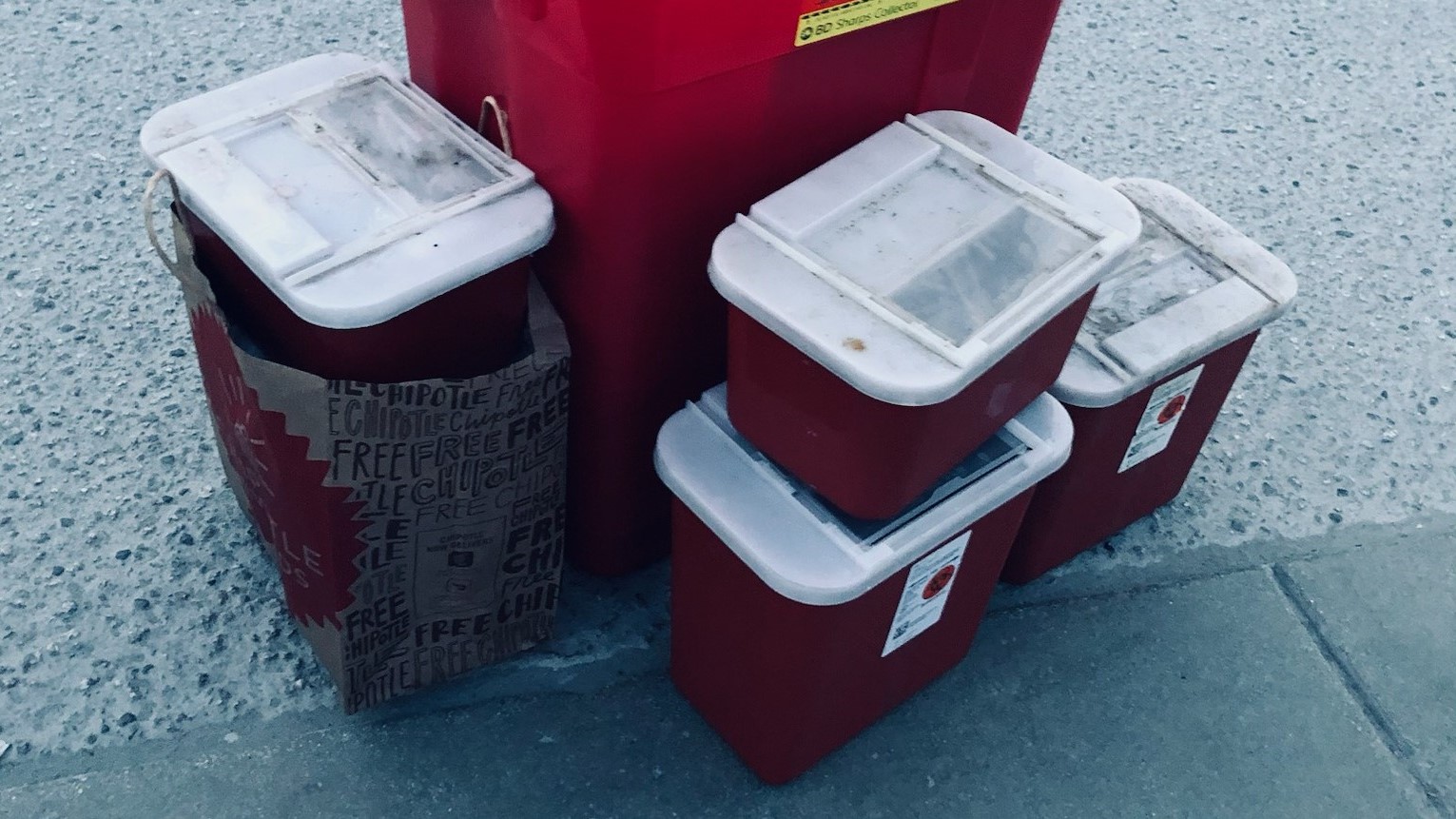
The Harm Reduction Coalition of Santa Cruz County collects more than eight needles for every 10 needles it distributes, according to a report it filed with state health authorities in 2023. (Denise Elerick — Contributed)
The Harm Reduction Coalition distributed roughly 600 naloxone kits monthly before November. The county’s needle exchange more than doubled its distribution of naloxone kits in December and January to 275 kits and 293 kits, respectively.
Changes since November
The county’s needle exchange has been one for one, meaning that clients can receive one clean needle for each used needle they bring, to a limit of 300 needles. Clients bring disposal boxes full of needles, and staff estimate the number based on volume, health leaders said in 2020.
At the Harm Reduction Coalition’s program, clients get as many needles as they ask for, regardless of how many used needles they bring. Most programs in California operate this way, and the California Department of Public Health recommends a need-based policy. Studies suggest that the policy helps prevent disease by reducing dirty injections and needle sharing.
The Harm Reduction Coalition distributed 304,500 syringes and received 255,700 back in the 12 months ended in August 2023, according to a report it filed with the state. That’s a return rate of about 84%.
People also dispose of needles in the county’s six syringe drop boxes. The boxes collected 611,715 needles in 2022, according to a county report.
In August, county health leaders started a pilot project for mobile needle exchange on Coral Street and in the Friendship Garden at Harvey West Park. It operates 11 a.m. to 1 p.m. Wednesdays.
County health leaders also started a second pilot project at Linear Park near the Pajaro River levee in Watsonville, but it stopped because the location became unavailable. County health leaders are seeking a new location agreeable to city leadership and the community, Hyland said.
The Harm Reduction Coalition is working on a new state application for a mobile needle exchange program. The Department of Public Health is expected to consult law enforcement and the county health officer and allow 45 days for public comment by state law.
Denise Elerick, the Harm Reduction Coalition’s founder and outreach coordinator, said the coalition has saved lives and responded to the community’s needs before it was shut down in November.
The clients “wanted a mobile program, which is one of many reasons why we applied for the application from CDPH years ago, always with the support of our public health officers,” Elerick said. “Of course we offer so much more. We offer a place to dispose of syringes, replace naloxone, get condoms and lube and get referrals to all kinds of services which are required by law. We have a staff member who is a medication-assisted therapy navigator. We throw in some smiles and have some fun together along the way.”
Since the exchange closed, clients told Elerick that clean needles became harder to find.
“We are currently seeing scarcity,” Elerick said. “People are calling us telling us they are forced to reuse, which is very harmful and can lead to infections that can be fatal,” Elerick said. “It is just cruel that we allow this.”
The lead plaintiff of the lawsuit against the coalition, Brad Angel of Grant Park Neighborhood Association Advocates, said that in the past few years no strewn syringes have been found during the group’s regular cleanup of Grant Street Park. He said the Downtown Streets Team also removes litter there frequently. The Downtown Streets Team found 2,650 needles in the City of Santa Cruz in 2023.
Angel said he wanted the Department of Public Health to incorporate the community’s outlook in a second Harm Reduction Coalition application.
“We are hopeful the CDPH will not approve another application without reaching out to community groups, the city councils, the police departments, and the county, and implement those concerns/guidance in the new organization’s needle exchange operations,” Angel wrote in a text message.
The Department of Public Health should “listen to what the sheriff’s department and the police department advise about the application,” Angel said.
Former clients describe outreach
Since the Harm Reduction Coalition stopped its distribution, some former clients said more people have been reusing dirty needles. About 1,225 people visited the coalition in 2023.
“Now you have people that are walking around at odd hours saying, like, ‘Does anybody have a rig?’” said Castle Rock-Home, a 40-year-old woman who said she was a frequent client of the coalition’s needle exchange. She said she lived in a tent camp on Coral Street with others until it was dismantled in January.
“Of course you want to help people, but at the same time it is not your job to take care of their needs,” Rock-Home said. “You do want people to be clean and safe, just so there’s not so much disease out there.”
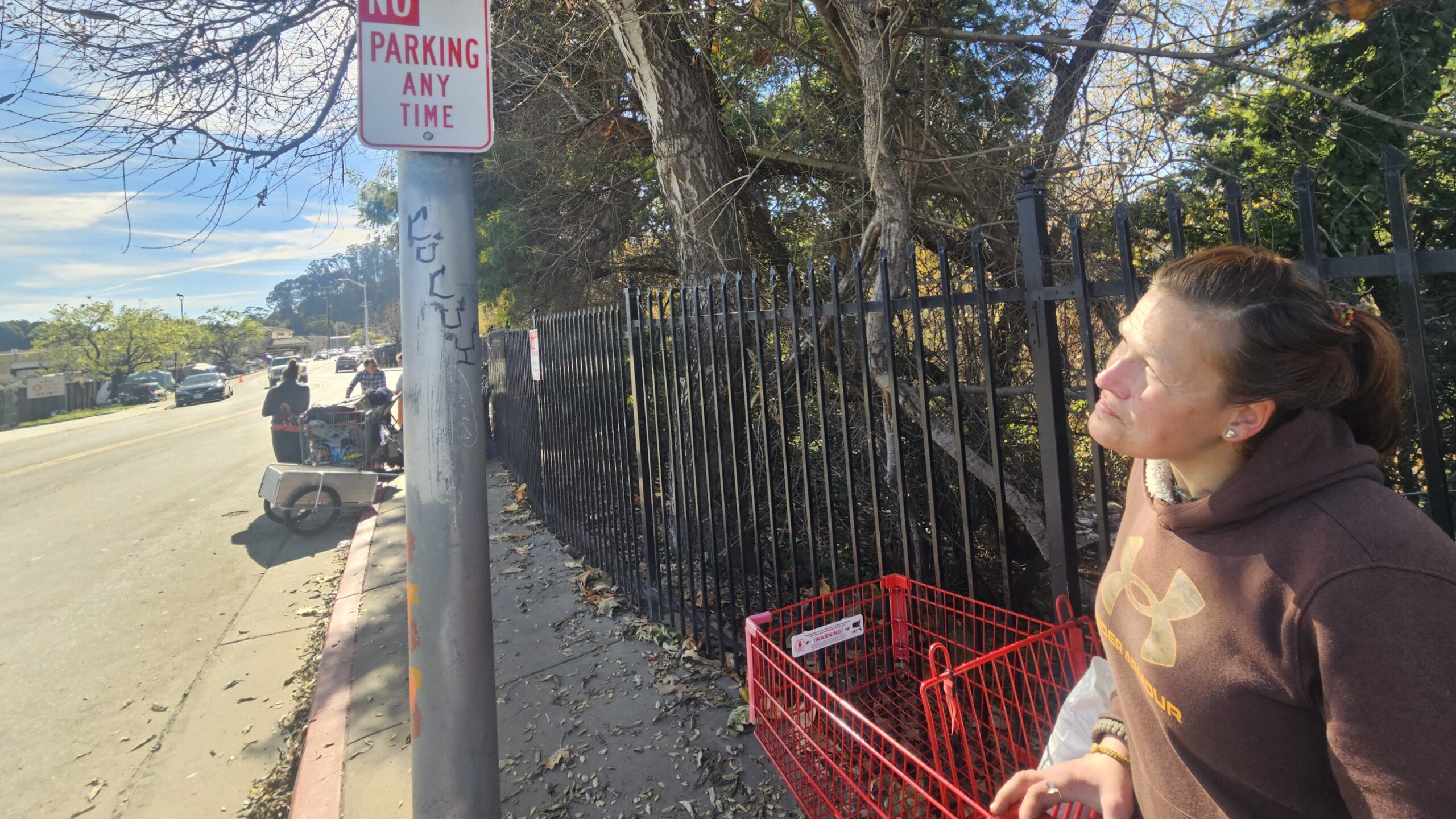
Castle Rock-Home, 40, was a client of the Harm Reduction Coalition’s needle exchange and other programs. (Tyler Maldonado — Santa Cruz Local)
Many of the coalition’s former clients said the compassion of the coalition’s volunteers and five employees’ helped people take better care of themselves.
Sarah Hass, 40, a client of the Harm Reduction Coalition, said its staff was understanding if a person wasn’t going to quit and supportive of attempts to get clean.
“They greeted you and got to know you,” Hass said. “You know there’s a lot of graffiti artists, songwriters, musicians. Not just addicts,” Hass said. “They tell people how to be cleaner, to wash their hands and stuff like that. And they’re encouraging when you decide to stop” using drugs.
Shannon Vudmaska, 55, agreed. She said compassion was necessary for recovery. “People need to realize that sometimes we need to get over the effects of traumatic events before we’re ready or willing to get back up on our feet. And if we don’t have a community connection, then we have nobody to put their arm around us and help walk us through,” Vudmaska said.
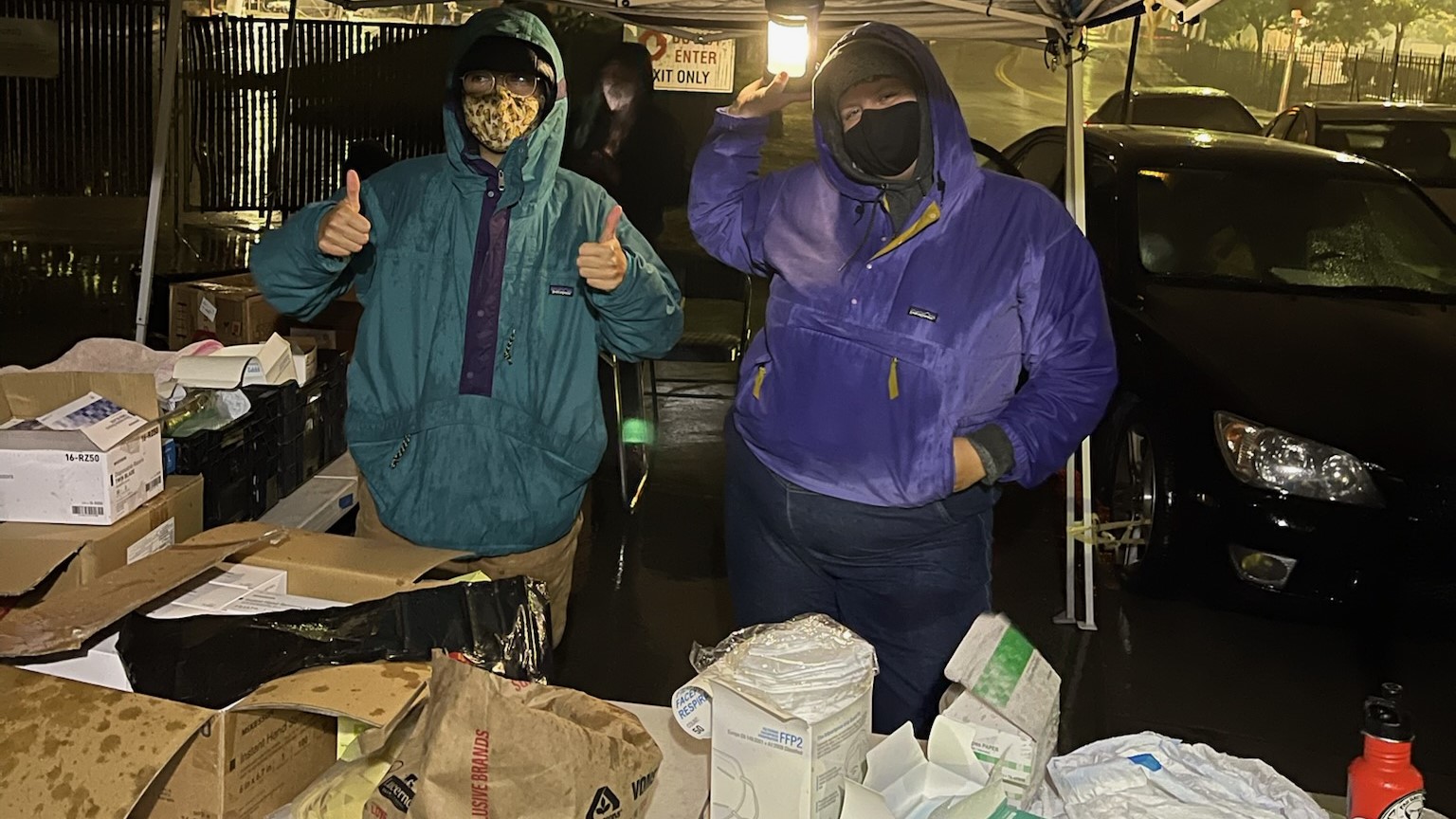
Members of the Harm Reduction Coalition of Santa Cruz County work on Coral Street. (Denise Elerick — Contributed)
“If people are getting their needles and things from needle exchange, they’re also getting information. They’re also getting to know people who care about them, they’re getting the connection,” she said. “So we’re aware when somebody doesn’t show up. When they were doing the Sunday (needle exchange program), almost everybody came down here. If somebody wasn’t there, people would go check their tent.”
Vudmaska said that because there are fewer clean needles available, some drug users have shared needles, reused old needles or smoked Fentanyl instead. Changes in use habits can lead to mistakes in preparing doses and increase dangers, she added.
“If somebody else is making up your shot or somebody else is doing your hit, then you’re not as in control, right? There have been several overdoses due to the fact that people have been smoking” rather than taking their usual drugs, said Vudmaska.
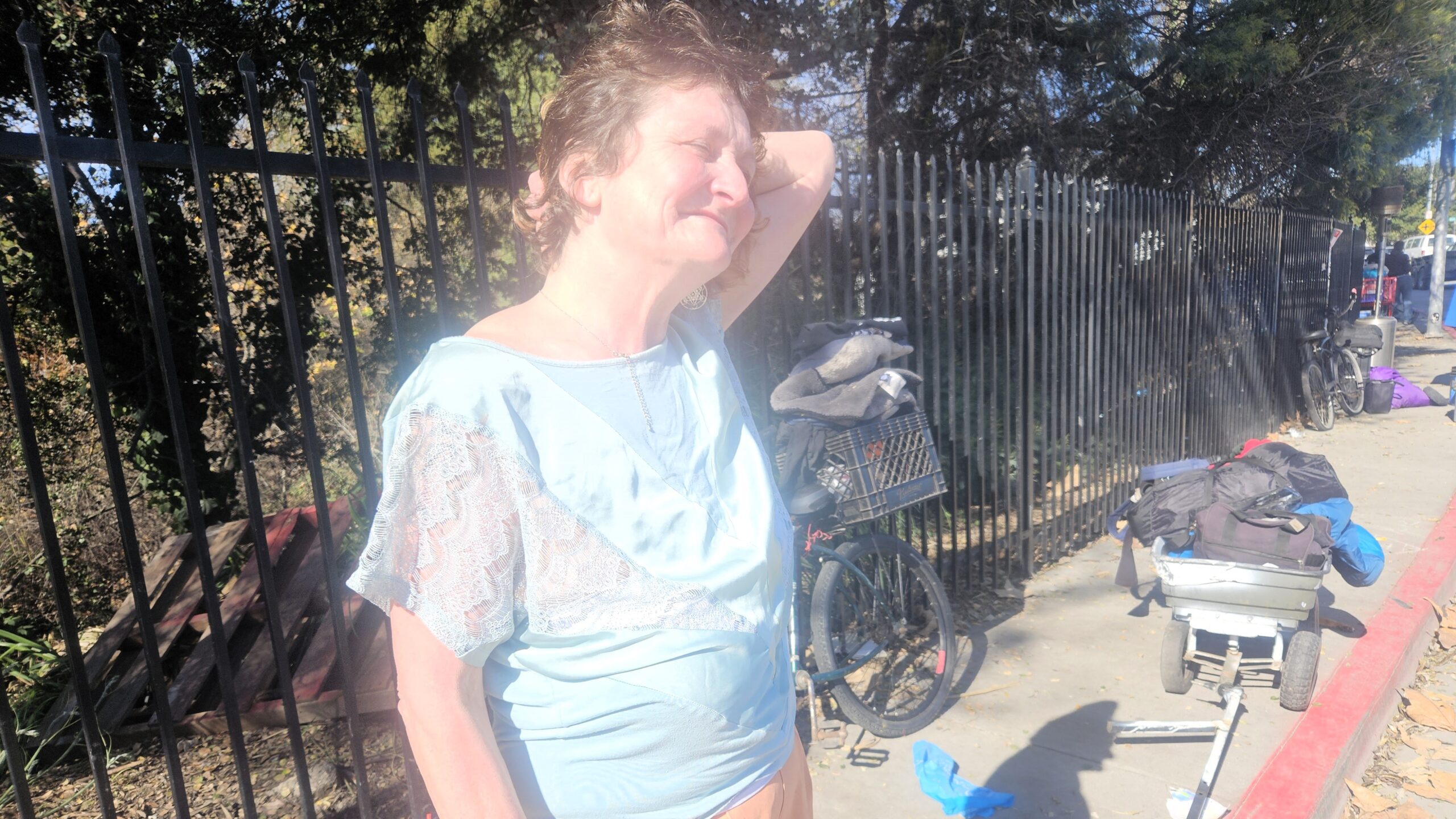
Shannon Vudmaska, or “Mama Shannon”, considers her next steps after a tent camp is closed on Coral Street. Vudmaska worked with Denise Elerick of the Harm Reduction Coalition. (Tyler Maldonado — Santa Cruz Local)
Legal battle
The petitioners who brought the lawsuit in 2020 cited a lack of oversight from local authorities and insufficient environmental consideration. It said the coalition’s actions “undermined and is in direct conflict with professionally trained and managed local health and human services programs operated through” the county’s Health Services Agency.
An appellate court ruled in November that he Harm Reduction Coalition’s 2020 application to the Department of Public Health was in appropriate in part because it “failed to engage in the required consultation, failed to provide the required notice to three local police departments about the comment period, and failed to provide the required 90 days for comment.”
Local law enforcement agencies were opposed to the application from the beginning, according to court documents.
The ruling also stated that the Department of Public Health did not adhere to the California Environmental Quality Act in place at the time. However, as of 2022, the Department of Public Health is not required to do a public environmental review in consideration of a new needle exchange application.
Read more
Questions or comments? Email [email protected]. Santa Cruz Local is supported by members, major donors, sponsors and grants for the general support of our newsroom. Our news judgments are made independently and not on the basis of donor support. Learn more about Santa Cruz Local and how we are funded.
Tyler Maldonado holds a degree in English from the University of California, Berkeley. He writes about housing, homelessness and the environment. He lives in Santa Cruz County.



